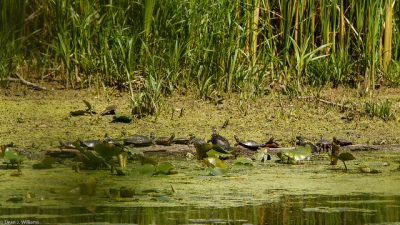Vermont Natural Resources Council Files Petition to Strengthen Safeguards for Laplatte River Marsh Wetlands
Agency of Natural Resources to review petition of Wetlands for Class 1 designation, considering exceptional contribution to Vermont’s natural heritage.
The Laplatte River Marsh is recognized as one of the state’s highest quality wetlands. Located in the town of Shelburne at the end of the Laplatte River, which drains into Lake Champlain, this nearly 150-acre wetland and floodplain forest ecosystem is a haven to sixty species of birds, twenty mammals, and fifty species of reptiles, amphibians and fish. The area is unique in its size and characteristics within the Champlain Valley Basin, and provides vital natural water quality functions that help protect Lake Champlain.
Today, VNRC filed a petition to reclassify the LaPlatte River Marsh as a Class I Wetland, which would grant it the highest level of protection under Vermont law. Reclassifying the wetlands as Class I would ensure that no development could take place within the wetland’s boundaries and set up a 100 foot buffer around the wetland.
Jon Groveman, VNRC’s Policy and Water Program Director said, ” The LaPlatte River Marsh is an extremely unique natural area that clearly deserves protection and recognition as a Class I Wetland. VNRC has a long history of advocating for Class I designation of wetlands, like our successful petition for the Northshore Wetland in Burlington, and we are proud to be able to bring forward this petition that highlights the values of the LaPlatte River Marsh.”
“Given its size, location, and composition of natural community types, this wetland plays an incredibly important role on the landscape. At the front door to Lake Champlain, it filters the water of the LaPlatte River, protects the water quality of Shelburne Bay, and provides much needed space for storing Lake floodwaters,” said Dori Barton an ecologist with Arrowwood Environmental, an ecological services and consulting firm that helped document the exceptional functions and values of the wetlands. “A host of wildlife species depend on this wetland for critical nesting, breeding and feeding habitat and a profusion of rare plants and animals inhabit this diverse resource. All of these features, and more, have made the marsh a rich outdoor classroom for inquiring students and an exciting playground for recreational enthusiasts. It’s truly an amazing place,” noted Barton.
ANR will review the petition to determine whether the wetland is exceptional in its contribution to Vermont’s natural heritage. The review includes the opportunity for the public to comment on the proposed Class I designation.





